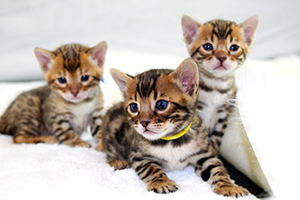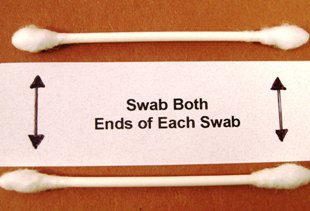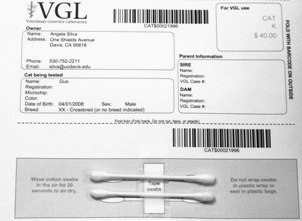Quick Summary
Click here for Price and Turnaround Time
Phenotype: Burmese hypokalemia is characterized by episodes of low serum potassium levels and high creatine phosphate kinase levels. Clinical signs include episodes of skeletal muscle weakness which is most obvious in the neck muscles, but sometimes occurs in just the limbs. As a result affected cats may show problems with walking and holding their head correctly.
Mode of Inheritance: Autosomal recessive
Alleles:N = Normal/Unaffected, BHK = Burmese hypokalemia
Breeds appropriate for testing: Australian Mist, Bombay, Burmese, Burmilla, European Burmese, Cornish Rex, Devon Rex, Singapura, Sphynx, Tiffanie, Tonkinese
Explanation of Results:
- Cats with N/N genoytpe will not have Burmese hypokalemia and cannot transmit this BHK variant to their offspring.
- Cats with N/BHK genotype will not have Burmese hypokalemia, but are carriers. They will transmit this BHK variant to 50% of their offspring. Matings between two carriers are predicted to produce 25% kittens affected by Burmese hypokalemia.
- Cats with BHK/BHK genotype will have Burmese hypokalemia, a condition causing episodic muscle weakness.
$44 one test per animal
Also available as part of the following packages:
$66 this test + one test from list below
$88 this test + two tests from list below
$110 this test + all tests from list below
- Burmese Head Defect
- GM2 Gangliosidosis in Burmese
- Polycystic Kidney Disease (PKD1) (recommended for Burmilla breed)
Cat DNA tests are carried out using cells brushed from your cat's cheeks and gums using household cotton swabs.
The cat DNA submission form with instructions and a place to tape the cotton swabs is sent to you via email after you place an order, and can be printed from your home computer. DNA test kits are no longer mailed.
Instructions
Step-By-Step:
1.
 Purchase regular household cotton swabs for cat DNA collection (the cotton swabs can be purchased at a pharmacy or drug store)
Purchase regular household cotton swabs for cat DNA collection (the cotton swabs can be purchased at a pharmacy or drug store)
2.

Make sure the cat has not had anything to eat or drink for at least 1 hour prior to collecting sample.
When swabbing kittens, isolate each kitten from the mother, littermates and any shared toys for 1 hour prior to swabbing. Kittens should not have nursed or eaten for 1 hour prior to collecting sample.
If collecting samples from more than one cat, make sure to sample one cat at a time and wash your hands before swabbing another cat.
3.
 Use both ends of the two cotton swabs for a total of four swabs.
Use both ends of the two cotton swabs for a total of four swabs.
4.
Place the cotton head of the swab between the cat’s gums and cheek and rub or rotate the swab back and forth for 15 seconds. Repeat with each cotton swab head, for a total of 4 swabs. We recommend swabbing a different area of the gums with each swab head.
5.
Wave the swab in the air for 10-15 seconds to air dry it before attaching it to the submission form.
6.
 After swabbing the cheek and gums, tape the cotton swabs to the bar-coded submission form printed from your MyVGL account.
After swabbing the cheek and gums, tape the cotton swabs to the bar-coded submission form printed from your MyVGL account.
ATTENTION:
- Do not collect saliva/drool – the key to obtaining a good sample is getting cheek cells on the swab.
- Do not rub swab on the cat’s tongue or teeth – this will result in poor quality sample.
- Do not collect a sample from a kitten that has recently nursed – the mother’s genetic material can rub off on the kitten’s mouth and contaminate the sample.
Burmese hypokalemia, also known as familial episodic hypokalaemic polymyopathy, is a recessive genetic defect characterized by episodes of low serum potassium levels and high CPK (creatine phosphate kinase, an enzyme that indicates muscle damage). Clinical signs include episodes of skeletal muscle weakness which can affect the whole animal or may be restricted to certain muscles. This is most obvious in the neck muscles, but sometimes occurs in just the limbs. As a result affected cats may show problems with walking and holding their head correctly. The disease is not typically fatal and affected cats usually can be managed by adding potassium supplements to their diet. For specifics on management of this condition, owners are urged to consult with their veterinarian.
The genetic mutation responsible for this disease was identified by a team of researchers from the University of Bristol (England), the Lyons Feline Genetics Research Laboratory at University of California, Davis, University of Sydney, Massey University, and Justus Liebig University. A nonsense mutation in WNK lysine deficient protein kinase 4 (WNK4) (c.2902C>T) results in a premature stop, resulting in a shortened protein product.
Testing for Burmese hypokalemia assists owners and breeders in identifying affected and carrier cats. Breeders can use these tests as a tool to avoid breeding carriers together, which would produce 25% affected offspring.
